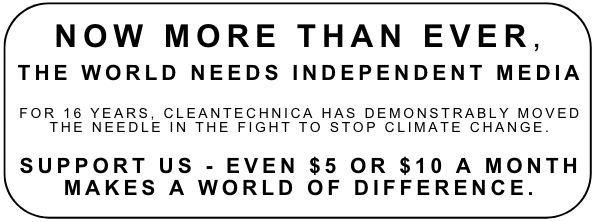
Sign up for daily news updates from CleanTechnica on email. Or follow us on Google News!
In this article, I comment on the recent podcast/video, “What Should Trump Do About Energy Policy?” below. I found it interesting to listen to, but I did have some issues with a few things, and maybe we can discuss them and both come away better informed.
Energy Policy Discussion
In the discussion of Chris Wright for the DOE pick, Adam expresses his pleasure at his fossil fuel background and support for nuclear. I used to have a significant part of my investment portfolio in oil investments and have always liked nuclear power.
In 2014, I spent some time researching the possible threat to my oil investments posed by solar. I concluded that it was uncompetitive in most places unless heavily subsidized. But as a software engineer, I have followed the technology space and know that Moore’s Law has been very important the development of the whole computer industry. Moore’s Law is similar to Wright’s Law, which states, “price of production for a given product will go down a fixed amount [different for different products] every time the cumulative number of units doubles.”
Of course, Wright’s Law isn’t a real law like the law of gravity, just a guideline that is useful — until it isn’t.
Oil Prices
The price of oil products in my lifetime has been volatile (mostly dependent on world geopolitical factors), but basically flat when adjusted for inflation.
One of the two major factors over the last 50 years have been that we are running out of the cheap oil that is close to the surface on land, forcing us to either drill deeper or in harsh environments like deep seas or the arctic, increasing costs substantially. And the other major factor has been that technology innovation (primarily fracking to recover “tight” oil and gas) has dramatically increased supply, lowering costs dramatically, mostly in the US. The net effect is no change in real prices in 60 years.
Solar Prices
Solar PV has a dramatically different cost curve. There have been many articles on this, but I like this one because of the pretty graphs. The short version is that costs are more than 1000-fold over 40 years and continue to decline at an annual rate of 30% with no end in sight. In seeing this 10 years ago, I knew that would impact my investments, so I slowly rotated out of oil. I agree with Bob’s comments that we won’t run out of oil anytime soon.
Stone Age didn’t end because we ran out of stones
Oil Age won’t end due to lack of oil#RenewableEnergy will end it pic.twitter.com/QL3d2pz7d4— Laudato Si’ Movement (@LaudatoSiMvmt) May 11, 2016
I agree with @AlexEpstein that fossil fuels have tremendously improved human flourishing, but I disagree with him that it will continue far into the future in light of the dramatic technology changes, primarily in solar and electric vehicles, that are happening now.
Nuclear
On nuclear, I have thought it to be a great low cost, reliable power source for many years that just needed less regulation and innovation to expand. But then I looked the cost curve of nuclear and found it has made no progress in 50+ years.
This short video below convinced me I was wrong and I should not support nuclear for massive expansion for many reasons.
- New nuclear makes no economic sense at 30 times the cost of solar and getting worse every year.
- RethinkX has shown solar, wind, & batteries can supply reliable power 365 days a year.
- Unexpected problems are extremely costly and dramatically impact reliability.
- Nuclear can’t vary its output as market prices change.
- Currently, nuclear uses too much water, for example in France, where nuclear uses 50% of freshwater.
- In high temperatures (as is happening more often), nuclear has to shut down since its cooling water becomes harmful to the river’s ecosystem.
- Nuclear requires wealth & political stability to run safely. Today 32 countries have nuclear power and most of the other 163 countries can’t build it.
- Risks of nuclear proliferation
- 10-year build times (best case) is too long to meet our needs.
- Nuclear reactors use a lot of exotic materials that are possible but difficult to mine (similar to solar & EVs).
- Safety of transport and storage of nuclear waste is challenging.
- If we 40X nuclear power to power the future world with current accident rates, we would have 1 serious nuclear accident every month, and it needs to be 100 times safer to be acceptable
Having said that, I don’t think there is any great need to shutdown existing nuclear, but the question is how much are you willing to use the force of government to subsidize it, since it can’t survive in most places without massive subsidies. My answer is a small amount, maybe $10 billion a year, declining over time. Bob is exactly right that liability caps are one of the significant subsidies that the government provides the nuclear industry. Adam is correct that new nuclear designs that are passively safe are much better because if something unexpected happens, they just shut down automatically without needing many skilled engineers with power and water available to safely shut down, like today’s plants. Michael Barnard has written many good articles on nuclear power, including how it isn’t compatible with Free Market Capitalism.
Federal Land Use
In terms of the leasing discussion, federal lands should allow leasing of land for solar in addition to oil exploration.
Wind, Solar, & Batteries Have A Bright Future, Especially Solar & Batteries
I disagree with Adam that wind and solar are mostly catastrophes. Although they are subsidized in many places, they are now competitive in more and more places without subsidies. The RethinkX article provides more background on both the reasonable costs and ability to efficiently deal with the intermittency problem by using the optimal combination of over-provisioning generation and installing batteries in 3 locations (California, Texas, and the Northeast). They predict this will happen without subsides, if not prevented by governments, and I agree. The existing oil industry will be asking for bailouts in the future, and would you use government force to bail out oil or coal? I do not. Obviously, today’s subsidies accelerate that trend.
Tony Seba’s concept of Superpower (surplus electricity at far less than a penny a kWh, available most of the time) will be a boon to many new users of electricity, including the Bitcoin mining Bob mentioned. Bob is correct that fossil fuels are more dense than renewable energy or batteries, although this is changing over time. But I don’t know if renewable energy will ever catch up.
Libertarian Solutions To Pollution
This wasn’t part of the podcast, but I continue to be disappointed that the libertarian community has mostly ignored Murray Rothbard’s excellent “The Libertarian Manifesto on Pollution.” It states that pollution is exacerbated by the lack of private property rights and how private suits by those harmed is a just solution instead of massive government intervention. Instead, most libertarians I know instead choose to ignore the problems.
Walter Block has an interesting video (below) on this also.
Realistically, we are a long way from enforcing private property rights to control pollution and carbon, so I think working within our existing model to make it as fair as possible is our best way forward.
I encourage @Rerazer and @BobMurphyEcon to respond to this and tell me what they learned and what I got wrong.
If you want to take advantage of my Tesla referral link to get Reward Credits, here’s the link: https://ts.la/paul92237 — but as I have said before, if another owner helped you more, please use their link instead of mine. If you want to learn more about Tesla’s new referral program (August 2024), Chris Boylan has written an excellent article on it.
Disclosure: I am a shareholder in Tesla [TSLA], BYD [BYDDY], Nio [NIO], XPeng [XPEV], NextEra Energy [NEP], and several ARK ETFs. But I offer no investment advice of any sort here.

Chip in a few dollars a month to help support independent cleantech coverage that helps to accelerate the cleantech revolution!
Have a tip for CleanTechnica? Want to advertise? Want to suggest a guest for our CleanTech Talk podcast? Contact us here.
Sign up for our daily newsletter for 15 new cleantech stories a day. Or sign up for our weekly one if daily is too frequent.
CleanTechnica uses affiliate links. See our policy here.
CleanTechnica’s Comment Policy




